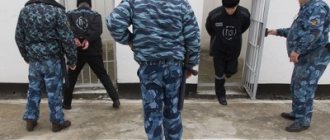1. The death penalty as an exceptional measure of punishment can be established only for especially serious crimes that encroach on life. 2. The death penalty is not imposed on women, as well as persons who committed crimes under the age of eighteen, and men who have reached the age of sixty-five by the time the court pronounces the sentence.
2.1. The death penalty is not imposed on a person extradited to the Russian Federation by a foreign state for criminal prosecution in accordance with an international treaty of the Russian Federation or on the basis of the principle of reciprocity, if, in accordance with the legislation of the foreign state that extradited the person, the death penalty is not provided for the crime committed by this person or the death penalty is not applied execution is a condition of extradition or the death penalty cannot be imposed on him for other reasons.
3. The death penalty by way of pardon may be replaced by life imprisonment or imprisonment for a term of twenty-five years.
Commentary on Article 59 of the Criminal Code of the Russian Federation
1. The death penalty is an exceptional punishment; can be assigned only for especially serious crimes that encroach on life.
2. By joining the Council of Europe, the Russian Federation committed itself to abolishing the death penalty. In this regard, since 1998, a moratorium on the use of this type of punishment has been imposed. In addition, the Constitutional Court of the Russian Federation, in Resolution No. 3-P <1> dated February 2, 1999, indicated that until the relevant federal law is enacted throughout the entire territory of the Russian Federation, every accused person has the right to have his case heard by a court with the participation of a jury, The death penalty cannot be imposed.
——————————— <1> See: Resolution of the Constitutional Court of the Russian Federation of February 2, 1999 N 3-P “In the case of verifying the constitutionality of the provisions of Article 41 and part three of Article 42 of the Code of Criminal Procedure of the RSFSR, paragraphs 1 and 2 Resolutions of the Supreme Council of the Russian Federation dated July 16, 1993 “On the procedure for enacting the Law of the Russian Federation “On introducing amendments and additions to the Law of the RSFSR “On the Judicial System of the RSFSR”, the Criminal Procedure Code of the RSFSR, the Criminal Code of the RSFSR and the RSFSR Code on Administrative offenses" in connection with the request of the Moscow City Court and complaints from a number of citizens" // SZ RF. 1999. N 6. Art. 867.
Despite the fact that since January 1, 2010, jury trials have been operating throughout the Russian Federation, in accordance with the Determination of the Constitutional Court of the Russian Federation of November 19, 2009 N 1344-O-R <1> this does not make it possible to apply the death penalty , including on a guilty verdict made on the basis of a jury verdict. The Constitutional Court of the Russian Federation proceeds from the fact that as a result of a long moratorium on the use of the death penalty, stable guarantees of the human right not to be subjected to the death penalty have been formed and a constitutional and legal regime has emerged, within which - taking into account international legal trends and the obligations undertaken by the Russian Federation Federation, an irreversible process is taking place aimed at the abolition of the death penalty.
——————————— <1> See: Determination of the Constitutional Court of the Russian Federation of November 19, 2009 N 1344-O-R “On clarification of paragraph 5 of the operative part of the Resolution of the Constitutional Court of the Russian Federation of February 2, 1999 N 3-P in the case of verifying the constitutionality of the provisions of Article 41 and part three of Article 42 of the Criminal Procedure Code of the RSFSR, paragraphs 1 and 2 of the Resolution of the Supreme Council of the Russian Federation of July 16, 1993 “On the procedure for enacting the Law of the Russian Federation “On Amendments” and additions to the Law of the RSFSR “On the Judicial System of the RSFSR”, the Criminal Procedure Code of the RSFSR, the Criminal Code of the RSFSR and the RSFSR Code of Administrative Offenses” // SZ RF. 2009. N 48. Art. 5867.
The death penalty in Russia according to the Criminal Code of the Russian Federation and the Penal Code of the Russian Federation
Baysarova Malika Ruslanovna master's student direction of training 04/40/01. Jurisprudence FSBEI HE "Chechen State University" E-mail
Death penalty, i.e. The deprivation of a person’s life, legalized by the state, is reasonably recognized as the most severe, exceptional measure of criminal punishment, which determines the extremely narrow possibilities of its application. In accordance with Article 20 of the Constitution of the Russian Federation, “the death penalty, pending its abolition, may be established by federal law as an exceptional measure of punishment for particularly serious crimes against life, providing the accused with the right to have his case heard by a court with the participation of a jury”[1].
In 1996, Russia joined the Council of Europe and ratified the European Convention for the Protection of Human Rights and Fundamental Freedoms[2], which contains, in particular, a requirement to prohibit the death penalty on the territory of member states. From this moment on, a moratorium was imposed on the use of the death penalty, and death sentences are not passed or carried out by the courts.
At the same time, national legislation has preserved the rules regulating the grounds for imposing capital punishment and the procedure for its execution. These norms are contained in the Criminal Code of the Russian Federation (hereinafter referred to as the Criminal Code of the Russian Federation)[3] and the Criminal Executive Code of the Russian Federation (hereinafter referred to as the Criminal Code of the Russian Federation)[4].
In accordance with paragraph 1 of Article 59 of the Criminal Code of the Russian Federation, the death penalty is understood as an exceptional measure of punishment, which is established only for particularly serious crimes that encroach on life. The criminal legislation of Russia provides for five elements of such crimes: premeditated murder under aggravating circumstances (part 2 of article 105 of the Criminal Code of the Russian Federation); encroachment on the life of a state or public figure (Article 277 of the Criminal Code of the Russian Federation); encroachment on the life of a person administering justice or preliminary investigation (Article 295 of the Criminal Code of the Russian Federation); encroachment on the life of a law enforcement officer (Article 317 of the Criminal Code of the Russian Federation); genocide (Article 357 of the Criminal Code of the Russian Federation).
It should be noted that the above list of crimes differs significantly from those for which the death penalty is or has been imposed under the criminal legislation of other states. Thus, there is increased attention to the protection of political figures and law enforcement officers of the state: even a failed attempt on their life could result in a death sentence. At the same time, capital punishment was not imposed for such particularly serious crimes as international terrorism, unleashing an aggressive war, etc.
In accordance with paragraph 2 of Article 59 of the Criminal Code of the Russian Federation, capital punishment cannot be imposed on: female persons; persons who at the time of committing the crime were under the age of majority (18 years old); persons who have reached 65 years of age at the time of the court verdict.
Also, the death penalty is not imposed on a person extradited by a foreign state for criminal prosecution in Russia if the death penalty is officially abolished in that state (Clause 2.1 of Article 59 of the Criminal Code of the Russian Federation).
Each sentence providing for the application of capital punishment to a criminal was verified in cassation by the Supreme Court of the Russian Federation. If the verdict was left unchanged in the cassation instance, the convicted persons themselves, as well as their lawyers, close relatives, representatives of labor collectives and the public, were left with the right to appeal to the President of the Russian Federation with a petition for pardon. The legislation did not establish specific deadlines for such treatment. Accordingly, the petition could be filed from the moment the verdict entered into legal force.[5]
If the petition for pardon was granted, then the death penalty was replaced by life imprisonment or imprisonment for a term of 25 years (clause 3 of Article 59 of the Criminal Code of the Russian Federation). The convicted person served this sentence in a special regime correctional colony (Part 6, Article 74 of the Penal Code of the Russian Federation), where he had to be kept isolated from other convicts (Article 80 of the Penal Code of the Russian Federation).
If the convicted person refused to apply for a pardon, the administration of the correctional institution had to draw up a report on this in the presence of the prosecutor. This act was sent to the Supreme Court and the Prosecutor General's Office of the Russian Federation for verification and an opinion. Then the conclusion and the act of refusal of the convicted person to apply for pardon were sent to the President of the Russian Federation, and the execution of the sentence was postponed until its final decision.
If a presidential pardon was not granted, the death sentence would be carried out.
The procedure and conditions for the execution of capital punishment are provided for in Chapter 23 of the Penal Code of the Russian Federation (Articles 184 - 186). The death penalty, according to the legislation of the Russian Federation, was carried out non-publicly by execution. Before the execution of the sentence, it was mandatory to identify the criminal and assess his mental state by a commission of three doctors. If a sentenced person was found to have a mental disorder, execution of the sentence was suspended.
In accordance with paragraph 2 of Article 186 of the Penal Code of the Russian Federation, during the execution of the death penalty, a prosecutor, a representative of the correctional institution and a doctor who recorded the death of the convicted person had to be present. The presence of other persons is not permitted. The administration of the correctional institution notified the court and one of the relatives of the convicted person about the execution of the sentence. The body of the executed person was not released for burial and the relatives were not informed about the place of his burial.
Thus, despite the presence of a moratorium on the death penalty, Russian criminal and penal legislation retains the rules establishing the grounds for imposing the death penalty and the procedure for its execution. However, the implementation of these norms is impossible due to the ban imposed by higher legal acts.
Literature:
- Convention for the Protection of Human Rights and Fundamental Freedoms ETS N 005 (Rome, November 4, 1950) // Information and legal system GARANT.
- Constitution of the Russian Federation, adopted by popular vote on December 12, 1993 (as amended on December 30, 2008, February 5, 2014, July 21, 2014) // Law of the Russian Federation dated August 4, 2014, No. 31, Art. 4398.
- Criminal Code of the Russian Federation dated June 13, 1996 N 63-FZ (as amended on July 6, 2016) // SZ RF dated June 17, 1996 N 25 Art. 2954.
- Criminal Executive Code of the Russian Federation dated January 8, 1997 N 1-FZ (as amended on November 28, 2015) // SZ RF dated January 13, 1997 N 2 art. 198.
- Commentary on the Criminal Code of the Russian Federation. In 3 volumes / Ed. V.T. Tomina, V.V. Serchkova. — Volume 1. General part. - M.: Yurait, 2016. - 250 p.
Another commentary on Article 59 of the Criminal Code of the Russian Federation
1. To date, a trend has clearly emerged aimed at the complete elimination of the death penalty as a type of criminal punishment. Article 20 of the Constitution of the Russian Federation emphasizes the temporary nature of this harsh measure: “The death penalty, until its abolition, may be established by federal law as an exceptional measure of punishment for especially serious crimes against life.”
2. Currently, punishment in the form of the death penalty cannot be imposed regardless of the status of the court considering cases of crimes for which the sanctions include the death penalty, on the basis of a decision of the Constitutional Court of the Russian Federation (see commentary to Article 44 of this Code).
3. The death penalty, like life imprisonment, is not applied to the specified categories of convicts.
4. The basis for the execution of the death penalty is a court sentence that has entered into legal force, as well as the decision of the President of the Russian Federation to reject the convict’s petition for clemency or the decision of the President of the Russian Federation not to apply pardon to the convict who refused to apply for clemency.
Federal Law of December 17, 2009 N 324-FZ, this article was supplemented by clause 2.1, which contains a ban on the use of the death penalty to a person extradited to the Russian Federation by a foreign state for criminal prosecution in accordance with an international treaty of the Russian Federation or on the basis of the principle of reciprocity . The ban will be justified if, in accordance with the legislation of the foreign state that extradited the person, the death penalty is not provided for the crime committed by this person or the non-application of the death penalty is a condition of extradition, or the death penalty cannot be imposed on him for other reasons.
The death penalty
The death penalty (Article 59 of the Criminal Code of the Russian Federation) consists of depriving the convicted person of the most important good - life.
The death penalty as an exceptional measure of punishment can be established only for especially serious crimes that encroach on life.
The death penalty is not imposed:
- women;
- persons who committed crimes under the age of eighteen;
- men who have reached the age of sixty-five at the time of sentencing;
- to a person extradited by the Russian Federation by a foreign state for criminal prosecution in accordance with an international treaty of the Russian Federation or on the basis of the principle of reciprocity, if, in accordance with the legislation of the foreign state that extradited the person, the death penalty is not provided for the crime committed by this person or the non-application of the death penalty is a condition for extradition or the death penalty cannot be imposed on him for other reasons.
The death penalty by way of pardon may be replaced by life imprisonment or imprisonment for a term of twenty-five years.
The exceptional nature of the death penalty is as follows:
- it is provided only for five particularly serious crimes related to an attack on human life (Part 2 of Article 105, Articles 277, 295, 317 and 357 of the Criminal Code of the Russian Federation).
- it is not prescribed to women, as well as to persons who committed a crime under the age of eighteen, regardless of their age at the time of sentencing; men who have reached the age of sixty-five at the time of sentencing.
- For those sentenced to death, the punishment may be replaced by imprisonment or life, or for a period precisely specified in the law - twenty-five years. The appeal of a convicted person with a petition for pardon constitutes the right of the convicted person and entails mandatory consideration by the pardon commissions under the heads of the constituent entities of the Russian Federation, and then by the President of the Russian Federation.
- Criminal executive legislation has established a number of additional guarantees against the execution of unjustified death sentences: mandatory issuance of opinions by the Chairman of the Supreme Court of the Russian Federation and the Prosecutor General of the Russian Federation on the absence of grounds for filing a protest against the court verdict in the manner of supervision.
According to the law, the basis for the execution of the death penalty is a court verdict that has entered into legal force, the above-mentioned conclusions of the Chairman of the Supreme Court of the Russian Federation and the Prosecutor General of the Russian Federation, as well as a notice of rejection of a petition for clemency or an act of refusal of the convicted person to apply for clemency ( Part 4 of Article 184 of the Penal Code).
The death penalty is carried out non-publicly by shooting. The administration of the institution where the death penalty is carried out notifies the court that passed the sentence, as well as one of the close relatives of the convicted person, about the execution of the punishment.
0










